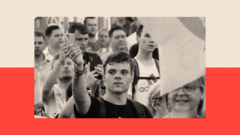The landscape of German politics is evolving as more young men are drawn to far-right ideologies, with the Alternative für Deutschland (AfD) party gaining traction among this demographic. Nick, a 19-year-old from Freiberg, expresses his desire for a peaceful country free from fear, echoing the sentiments of many others his age. While he supports some forms of immigration, he is particularly concerned about asylum seekers, linked to recent violent incidents.
In the upcoming national election, the AfD is projected to perform strongly, with Pew Research indicating that 26% of German men hold positive views of the party, a significant rise in recent years. This trend has been accompanied by increasing anxiety among youth, especially regarding conservative values. Social media is another driving force behind this movement, with the AfD dominating TikTok and utilizing the platform to connect with followers.
Supporters of the far-right party, including influencers like Celina Brychcy, convey messages that resonate with young men, emphasizing stricter immigration controls and traditional gender roles. As views on gender and identity shift, many young men feel alienated from prevailing progressive narratives, leading them to seek refuge in far-right ideologies.
Despite efforts to classify the AfD as extremist, the party has gained legitimacy in public discourse, presenting itself as a mainstream conservative option. As historical awareness of Nazism fades among younger generations, acceptance of far-right politics is growing, raising concerns about the implications for Germany's future democratic landscape.


















